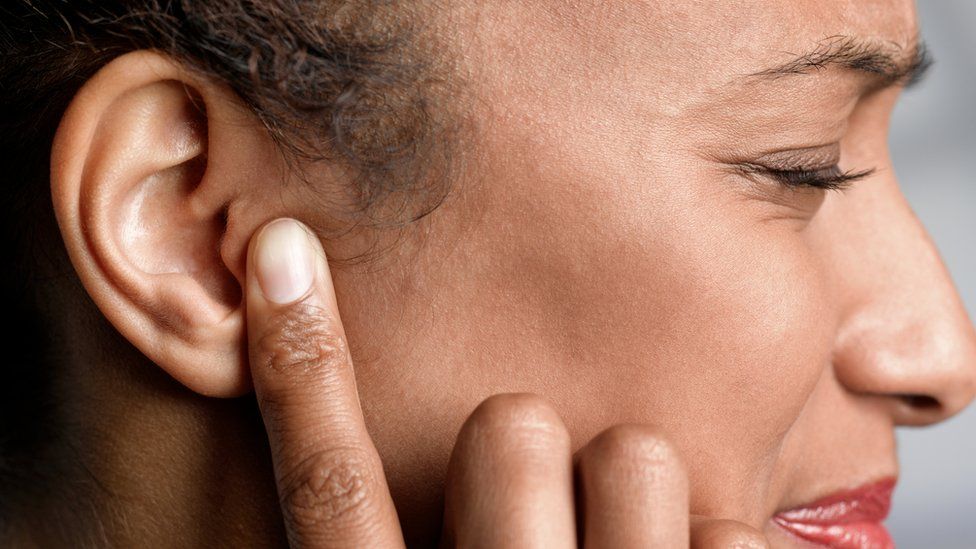ARTICLE AD BOX
 Image source, Getty Images
Image source, Getty Images
By Jim Reed
Health reporter
Almost 10 million people in England can no longer access free NHS earwax removal services, the RNID has warned.
The hearing loss charity said there was "no medical reason" for the withdrawal of NHS services across parts of England since 2019.
And some people unable to afford private treatment were turning to "dangerous self-removal methods".
The government said GPs can still refer patients on to a specialist service if the problem is linked to hearing loss.
Each year, about 2.3 million people in the UK need earwax treatment, according to the NHS.
It is more common among older people, hearing-aid users and those with a learning disability.
Wax build-up in the ear canal can cause painful symptoms including tinnitus, earache and hearing loss.
It often requires removal before a hearing test and can interfere with certain hearing aids, causing a distracting whistling sound.
Image source, Helen Kendall
Image caption,Helen Kendall says she pays for three £80 private appointments each year
Helen Kendall, 76, from Bath, Somerset, says she now has to pay £240 a year for private treatment, because the GPs in her area no longer offer a free service.
"When the wax builds up, I find it very difficult," she says.
"I lost some of my confidence and became unable to follow conversations.
"It led to increased isolation and I found I was withdrawing.
"I'm a sociable person - I volunteer at a food bank, I'm part of an art group and cook for a lunch club and I love the cinema.
"All of these rely on me being able to hear properly."
National Institute of Health and Care Excellence guidelines say wax removal should be provided in GP surgeries or other local ear-care services.
There are two main methods:
- microsuction - a small vacuum sucks out wax
- electronic irrigation - a machine gently pumps pressurised water into the ear
The RNID sent Freedom of Information requests to all 42 integrated health boards across England.
Of the 40 that responded:.
- 18 funded a full service
- 15 restricted eligibility or did not offer the service across all their GP surgeries
- seven commissioned no treatment at all
The charity's director of health, Crystal Rolfe, said: "For the 10 million people who live in areas where there is no provision, the only option is to pay for it, which we know can cost up to £100 for just one procedure.
"Previous research shows that 26% of people say they wouldn't be able to afford that, partly because some people need to have earwax removed several times a year."
Getty
No NHS ear wax services
7 areasBirmingham & Solihull, Cornwall & Scilly Isles, Dorset, Mid & South Essex, NW London, SW London, Suffolk & NE Essex
Source: RNID
The charity is concerned that a lack of provision in some areas means more patients may be trying to remove wax themselves.
The strong advice is "never put anything in your ear smaller than your elbow".
Other objects - from cotton buds to paper clips and hairpins or even fingers - should never be used in the ear canal itself.
"For most people, it's a self-cleansing mechanism and the wax just comes out on its own," Ms Rolfe says.
"If it's got stuck in your ear, then you should go and see a GP, who might sometimes suggest olive oil drops in the first instance."
Some commercial drops are available over the counter - but there is "little evidence" drops or sprays will resolve the issue in more than one out of every five people, the RNID says.
Drops would not be recommended for those who have had a recent infection or operation - and the patient should speak to a pharmacist first.
Microsuction is the most common way to remove earwax
The government said local health boards are responsible for commissioning services in their area based on the needs of the population, and GPs can still refer patients to a specialist audiology service if the problem is linked to hearing loss.
An NHS England spokeswoman said information about treating earwax safely at home was also available on the NHS website.
The Scottish and Welsh governments remained "committed to ensure the availability of NHS earwax-removal services", the RNID said.
And it would "lobby for the same commitment" in Northern Ireland, once devolved government was restored.
Related Internet Links
The BBC is not responsible for the content of external sites.

 1 year ago
39
1 year ago
39








 English (US) ·
English (US) ·